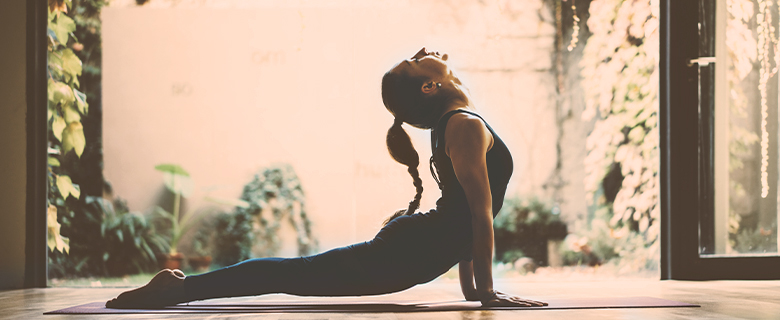
How To Stay Fit At Home
Words like the lockdown, corona virus and Covid-19 have become commonplace in our dictionary. Everyone is trying their best to navigate through the impositions felt by the new world. And each of us has a choice to either accept it happily, or not. Either way, staying at home is compulsory. So why not take up the things which we couldn’t do in our past due to our busy schedule? After all, staying positive will let the time pass by more smoothly.
But what about the work that’s been stalled? What about the losses faced in business? What can be done about incomplete projects and unhappy clients?
If we keep focusing on these troubles, it will only add to our stress levels. Instead of thinking about what we can’t change, why not think about what can be changed. In spite of positive, self-care advice, there are many people who are unable to push past their worries. Hence, they divert their time into excessive sleeping or eating to cope up with the stress. With no scope for outdoor games or activities, kids at home, too, end up munching on snacks throughout the day to quell their boredom.
This kind of lifestyle will impact our health in the long run. Once we settle into a habit of laziness and overeating, it won’t be easy to get rid of even after the lockdown is lifted.
So what can we do to overcome this unfortunate situation?
Ayurveda texts give us detailed information about what constitutes a healthy daily routine.
But before we begin, ask yourself why it’s important to do things according to a particular time or kaal.
The answer is quite simple: Everything in the universe has a fixed routine and follows the same everyday pattern. By knowing what to expect at a certain time, our body clock regulates itself and, thus, helps us function properly.
For example, these are the things that can go wrong when our routine is disrupted.

Sleeping more than the required hours creates a feeling of heaviness in the body and slows down our digestion.

Improper digestion coupled with overeating will not only lead to weight gain but also poor nourishment of dhatu (bodily elements) such as rakta (blood), mamsa (muscles), medha (fat), rasa (lymph), asthi (bone) and so on.

For improving your digestion, it’s important to stay physically active. Instead of sleeping in your free time, focus on physical household chores or home workouts with yoga or Zumba.
To understand this better, let’s take a look at how we can follow and benefit from a healthy routine.
Daily Ayurvedic Routine To Stay Healthy At Home
Ayurveda divides the day into three time frames – vata kaal, kapha kaal and pitta kaal – according to the dominance of the three doshas in that specific period.
Vata Kaal: 4 am – 6 am | 4 pm – 6 pm

The best time to wake up is as early as 2 hours before sunrise, i.e., around 4 am. This is the vata kaal, which is considered the ideal phase of time for smooth excretion of stools and urine to prevent imbalances in vata.
Now you may feel like waking up at 4 am isn’t your cup of tea, but consider all the health benefits you’ll miss out on unless you try it.

Starting your day between 4 am and 5 am will keep vaat dosha under control.

Use this time for a morning routine that includes nasya (putting oils in the nostrils), karna puran (putting oil in the ears), gargling with hot water to remove excess kleda (stickiness) in the mouth, brushing the teeth, and abhyanga (application of oil on the whole body).

This can be followed by exercises, as sweating helps in oil absorption.

If you’re feeling stressed or anxious, you can practise meditation in the morning.

Students can utilise this period or the kapha kaal for studies, as early mornings are considered the best time to retain what we learn for longer.

However, in reality, we wake up by 8 am or by 10 am or even at 2 pm in the afternoon, because most of us believe that there is nothing else to do but stay at home.

It’s important to start the day early to avoid getting up at a time when we should actually be exercising after finishing with our morning regimen.
Kapha Kaal: 6 am – 10 am | 6 pm – 10 pm

Exercise is something that should be done on an empty stomach in the kapha kaal. The kapha kaal covers the first four hours of day from sunrise, i.e., from 6 am to 10 am, and the four hours after sunset, i.e., from 6pm to 10 pm in the night.
Now when we mention exercise, we do not mean exertion. You should restrict your daily workout based on your prakruti, and in accordance with the season.
To identify your prakruti , take our 10-minute questionnaire.

Vatas are generally agile and have quick bursts of energy but tire easily. If you are a vata dosha you will benefit from grounding and healing exercises such as yoga, Tai Qi, Qi Gong, walking, cycling and dancing.

Pittas are usually fiercely competitive, strong and have good muscle development. If you are a pitta dosha, you will enjoy active sports, cycling, running and swimming. Nature trails and gardening is considered calming for pittas.

Kapha body types are known to be hypo-metabolic and move slower but have steady energy and great physical strength. Endurance activities like running/walking, aerobics, dance and weight lifting can keep a kapha type motivated and healthy.
Pitta Kaal: 10 am – 2 pm | 10 pm – 2 am

Pitta kaal is spread from 10 am to 2 pm in the day and from 10 pm to 2 am at night. You should eat food in the pitta kaal as our digestive power is the strongest during this time frame.

Eat by 10 am when the pitta kaal starts to properly digest your food and improve your metabolism.

When we get up at 2 pm in the afternoon, we’ve actually kept our body starving and eat food when our digestive power has become weak after prolonged fasting.

This leads to obesity or low absorption of nutrients, which further affects our immunity, increases our risk of infection, causes constipation or indigestion, and elevates stress and anxiety.
A disciplined routine will not only increase your stamina and endurance, but it will also benefit you by preventing unwanted physical and mental health disorders.
As adults, we have lots of responsibilities towards our society and towards our kids. When our kids see us following a healthy regimen, they will emulate us too. This will inculcate healthy values amongst families and positively impact society as a whole.
Stressing over losses which have occurred during this situation will never solve the problem. It will only create more issues which will have to be faced after the lockdown is over.
If you’re looking for personalised guidance, don’t hesitate to ask for help.
You’re welcome to sign up for an Ayurvedic consultation with Mi.Bo.So. We can provide 24/7 wellness care on call or over video in the comfort of your home. Our team, consisting of Ayurvedic vaidyas, nutritionists and yoga coaches, is here to guide you in your daily routine and help you stay on track.
Let’s give a new start to our health in this lockdown and continue this wellness journey in the future so that we can become happy and secured in all aspects of life.
If you have any questions, do leave a comment below and our team will get back to you.





4 Comments
Prashant
Will I really see a difference in my health by following the vata, pitta and kapha time periods?
ReplyAyurveda dinacharya is based on vata pitta and kapha time period. One should follow it for better hunger, digestion, metabolism, sleep and wellness.
Circadian rhythm or body clock is defined the same. If you follow your vata pitta and kapha regimen, it will definitely offer you health, strength, intellect, memory and immunity.
Sayali
Does your consultation package provide a daily Ayurvedic routine?
ReplyHello! Yes, of course. If you’d like to know more, check: Ayuvi Plans Our consultation package gives you access to easy-to-use healthcare technology and connects you to Ayurvedic vaidyas, certified nutritionists and yoga coaches. Depending on the duration of your course (programme), the healthcare specialists will customise your daily lifestyle routine with the right diet, exercise and yoga regime, meditation practices, stress management, Ayurvedic therapies, and more. Hope this answers your question. Take care!
Thank you. Your comment will be visible after an approval.
Add your comment